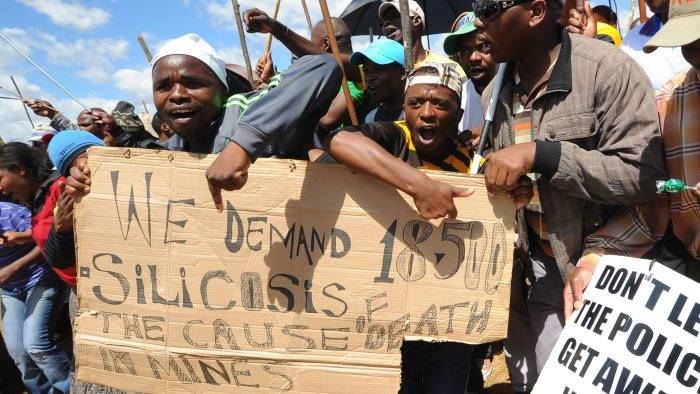Thousands Of SA Miners Strike USD 346 Mn Worth Of Gold Without Having To Dig Up Dirt

Thousands of former gold miners in South Africa will share USD 346 Mn as compensation for a disease contracted while working underground. Half the miners are already dead.
A major ruling by the high court in Johannesburg has just seen tens of thousands of former South African gold miners strike gold in more ways than one.
The gold miners who were suing their former employers for the life-threatening illnesses they contracted while digging up tonnes of dirt in the mines have just scored a compensation deal that could be over USD 346 Mn.
After a rather long legal tussle spanning years of negotiations, a high court in South Africa’s commercial capital ruled in favour of the many former miners who had filed a class-action suit against the mining companies they used to work for, bringing an end to a drawn-out court battle and sparking wild jubilations on one side and tales of doom and gloom on the other.
The wheels for the monumental development were set in motion back in 2016 when a South African judge gave the green light which allowed lawyers to launch an unprecedented class action on behalf of miners suffering from a condition known as silicosis; an incurable ailment caused by the inhalation of silica dust from gold-bearing rocks. Yesterday’s “historic” ruling was the culmination indictments and negotiations that have been on for years.
Up to 500,000 former mineworkers in South Africa and neighbouring countries are thought to have the disease after spending years drilling in narrow tunnels. Many have been unemployed after being laid off by mining companies since as far back as 1965.
The compensation amount will vary from case to case but it is expected to not exceed USD 35 K per person, though many could go home with a lot less than that.
Those who spoke for the miners’ interests argued that the dangers from silica-laden dust were talked up a century ago as the South African mining boom got underway.
A solution which entailed blowing large amounts of chilled air through the mines and the masks of the miners was also prescribed, but the calls to make the mines safer for the miners went largely ignored for years because the companies didn’t want to spend any more money than they thought they had to. It was only recently that the companies implemented the solution. But the damage had already been done and it came in the form of silicosis.
The disease causes shortness of breath, a persistent cough and chest pains, and makes people susceptible to tuberculosis.
Compensation negotiations were stalled and derailed somewhat by the decline of the gold mining industry. An additional reason for urgency was the age and infirmity of the miners with silicosis — half of the potential claimants have passed on. The recent compensation agreement, thus, brings some degree of respite to those who have suffered in one way or the other.
For decades, South Africa was the world’s top producer of gold, but over the last decade, it has fallen from its perch as it now occupies eighth place behind Peru in the list of the world’s top gold destinations. Regardless, South Africa is still thought to be the source for about a third of all the precious metal traded globally.
Miners played a key during the country’s apartheid struggles and the mining industry has remained a centre of discord even though it’s been years since the struggle ended.
One of the most traumatic episodes can be traced to 2012 when 34 miners who were calling for higher wages were allegedly gunned down by police just outside a platinum mine near Johannesburg.
Former miners with silicosis and other diseases have been receiving limited compensation from a government-administered fund for some time now. The mining companies make contributions to the fund, but the paltry amounts collected and the huge backlog of claims have caused untold pain and hardship to the relatives of miners who have already passed on without receiving anything.
Silicosis takes about 10 years to manifest in miners from constant inhalation of dust and this delay may have something to do with why the extent of the problem is still not fully grasped.
Many of the miners affected by the disease are from remote rural areas, sometimes in neighbouring countries, who suffer from the condition without any idea the real cause of their suffering. And the recent compensation agreement could be lauded as some kind of respite for the families of the fallen miners.
Featured Image Courtesy: ft.com